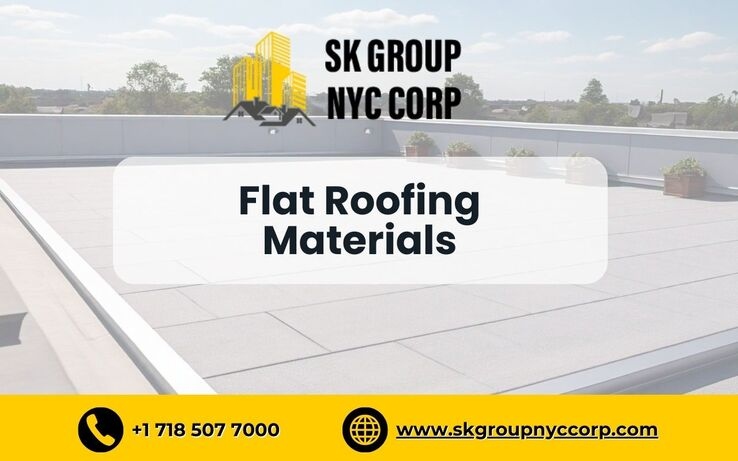Flat roofing is a signature style in NYC. It’s modern, practical, and space-saving. To keep your flat roofing durable and efficient, choosing the right flat roofing materials is essential.
Table of Contents
What Are Flat Roofs?
Flat roofs have a minimal slope, unlike traditional pitched roofs. They are a key part of urban roofing solutions in NYC, offering practicality and style. Their design allows for added utility, like rooftop gardens or solar panels. To ensure your flat roof stays in top condition, make sure to invest in professional Roofing Services that cater to its unique needs.
Advantages of Flat Roofs
Flat roofs are cost-effective and easy to install. They maximize usable space and can accommodate HVAC systems or patios. Their sleek design is ideal for modern architecture.
Top Flat Roofing Materials
Choosing the right material depends on your needs. Some prioritize energy savings, while others focus on durability. Let’s explore the best options available.
EPDM Roofing: Flexible and Reliable
EPDM is a synthetic rubber that’s lightweight and durable. It’s highly resistant to UV rays, making it perfect for NYC’s sunny summers. With proper maintenance, it can last over 20 years.
Pros: Affordable, weather-resistant, and eco-friendly.
Cons: Can be prone to punctures without regular care.
TPO Roofing: Energy Efficiency at Its Best
TPO, or Thermoplastic Polyolefin, is a reflective roofing material. It helps reduce cooling costs by reflecting sunlight. Its smooth surface prevents dirt and algae buildup.
Pros: Reflective, low maintenance, and cost-efficient.
Cons: Shorter lifespan compared to some alternatives.
Modified Bitumen: Tough and Durable
Modified bitumen combines asphalt with reinforced layers. It’s designed to withstand heavy foot traffic and harsh weather. This material is great for roofs that need extra strength.
Pros: Affordable, strong, and long-lasting.
Cons: Requires professional installation for best results.
PVC Roofing: The Durable Option
PVC is a flexible material with excellent waterproofing. It’s resistant to fire, chemicals, and punctures. Its long lifespan makes it a popular choice for flat roofs.
Pros: Highly durable and energy-efficient.
Cons: More expensive than other options.
Built-Up Roofing (BUR): A Traditional Choice
BUR consists of multiple layers of tar and gravel. It provides excellent insulation and protection against leaks. This classic material has been used for decades in NYC.
Pros: Thick, weather-resistant, and great insulation.
Cons: Heavier than other materials, which may require additional support.
Factors to Consider When Choosing Materials
Your choice of roofing material depends on several factors:
- Budget: Some materials cost more upfront but last longer.
- Usage: If you plan to walk or use the roof, choose durable options like BUR or modified bitumen.
- Energy Efficiency: Materials like TPO or PVC can lower energy bills.
- Weather Resistance: NYC experiences diverse weather, so waterproof and UV-resistant materials are ideal.
Maintaining Your Flat Roof
Flat roofs need regular upkeep to stay functional. Follow these simple tips:
- Clear Debris: Remove leaves, branches, and dirt to prevent blockages.
- Inspect for Leaks: Check for cracks or pooling water after heavy rains.
- Professional Inspections: Schedule regular checkups to catch problems early.
Routine care can significantly extend your roof’s lifespan and prevent costly repairs.
Final Thoughts
Flat roofs are more than a design choice—they’re a functional, modern solution for urban living. Choosing the right flat roofing materials ensures your roof remains reliable for years.
Whether it’s the affordability of EPDM or the durability of PVC, there’s a perfect material for every need. For insights on maintenance and repairs, check out our blog on Flat Roof Repair. For expert guidance and high-quality roofing services, contact SK Group NYC Corp today. Let’s build a roof that works as hard as you do!
Contact SK Group NYC
🌐 Website: www.skgroupnyccorp.com
📍 Serving: Manhattan, Brooklyn, Queens, The Bronx, and Staten Island
📍 Address: 87-88 172nd St, Jamaica, New York, NY, United States, New York

